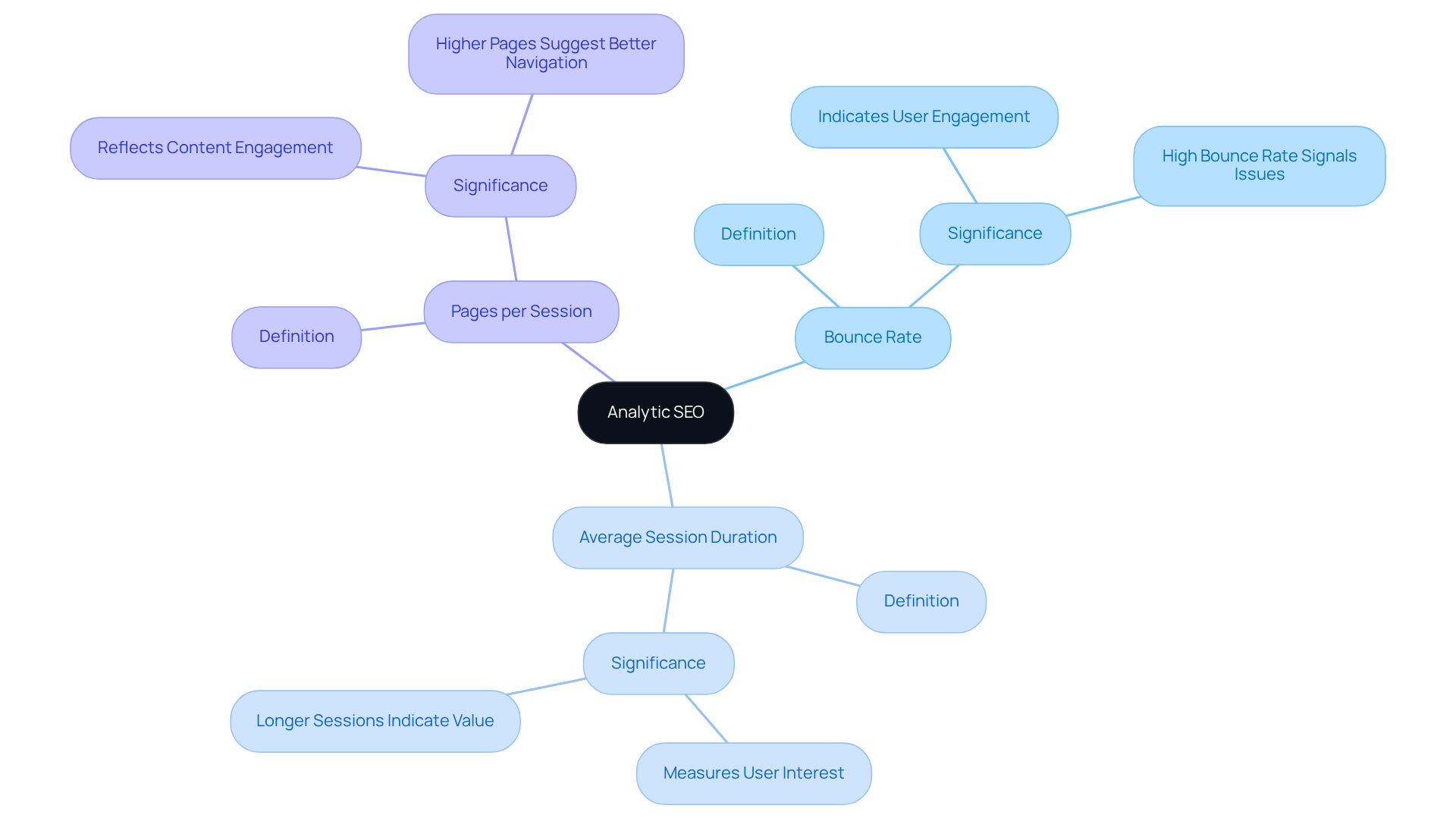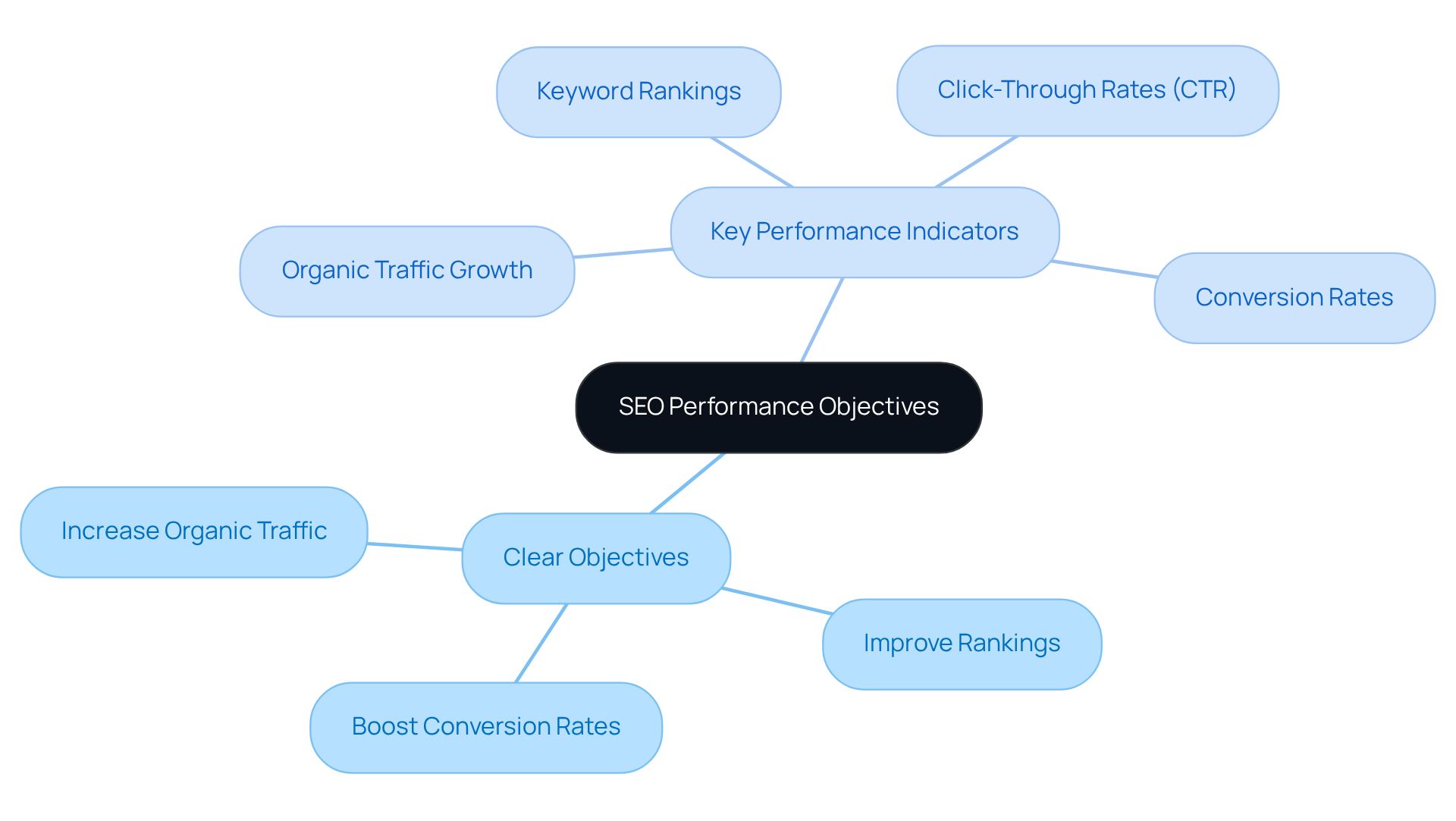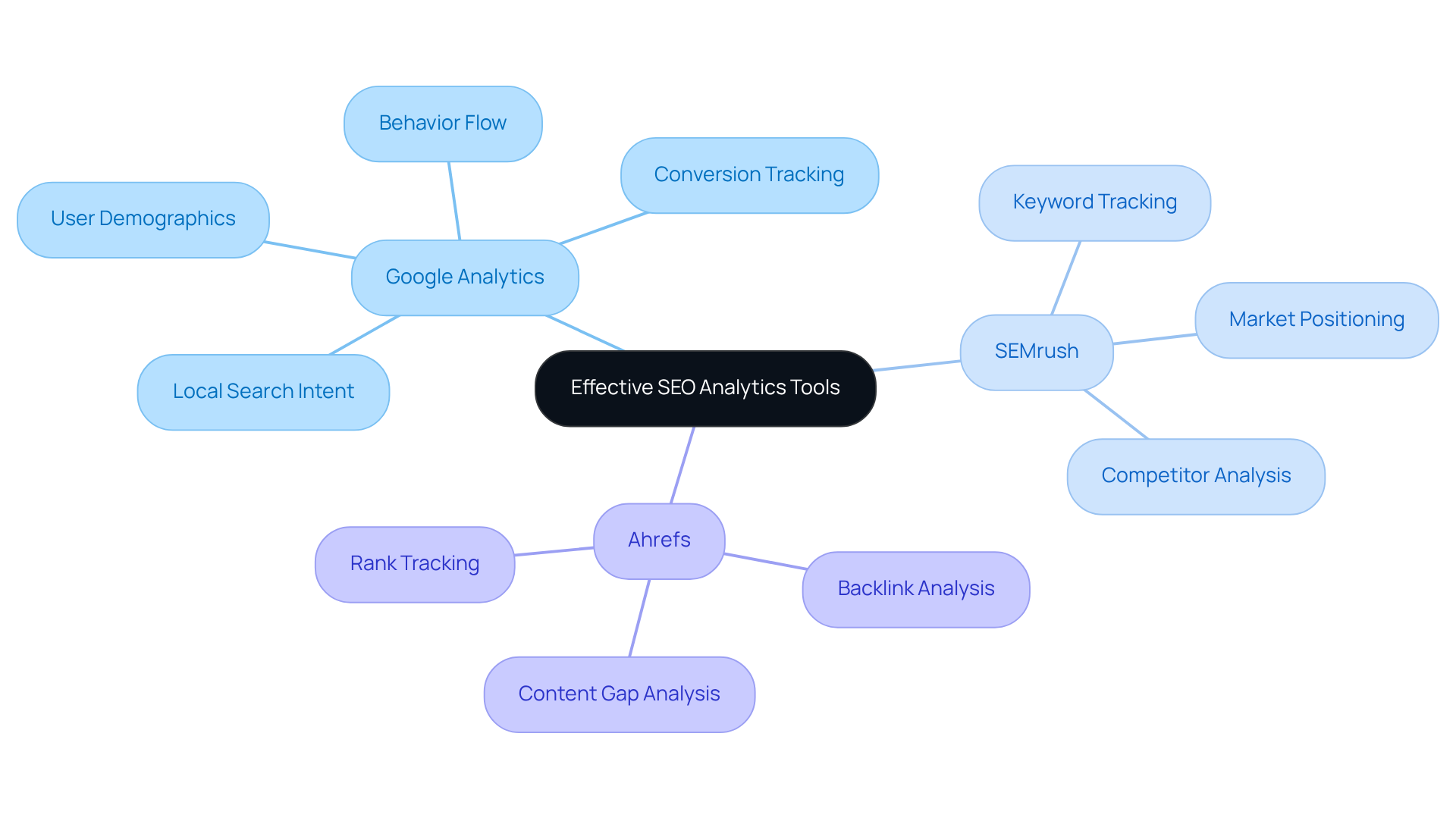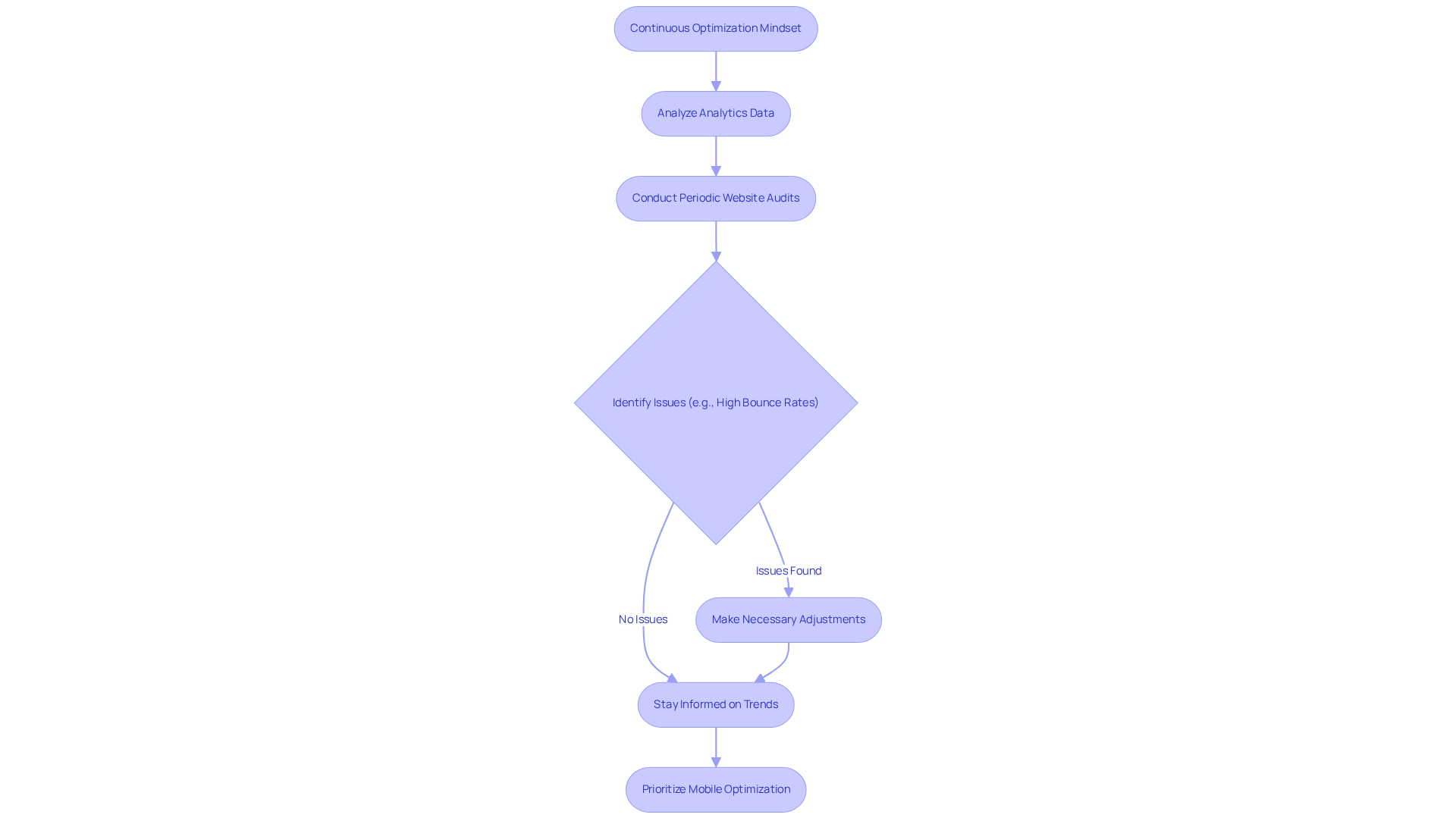Overview
Mastering analytic SEO can feel overwhelming for tech startups, especially when navigating the complexities of data analytics. Many founders struggle with how to effectively enhance their search engine optimization strategies, which can lead to frustration and missed opportunities for user engagement. This challenge not only impacts visibility but can also hinder growth in a competitive digital landscape.
However, there is hope. By focusing on essential metrics, utilizing the right tools, and committing to continuous optimization practices, startups can empower themselves to make informed decisions. It’s about tracking performance and adapting to market changes, which is crucial for driving sustainable growth. Remember, you’re not alone in this journey; many have faced similar challenges and found success through perseverance and the right strategies.
At RNO1, we understand the unique struggles of tech startup founders. We’re here to support you in leveraging analytic SEO to improve your visibility and user engagement. Together, we can navigate this path and unlock the potential for your startup to thrive.
Introduction
Navigating the digital landscape can feel overwhelming for tech startups, particularly when it comes to mastering analytic SEO. This essential component of search engine optimization requires not just an understanding of user behavior and traffic patterns, but also the ability to leverage data for informed decision-making that fosters growth.
By embracing the power of analytic SEO, startups can turn uncertainty into actionable insights, ultimately boosting their visibility and engagement. Yet, many founders may wonder: how can these emerging businesses effectively harness analytics to not only survive but truly thrive in a competitive market?
It's a journey that many have faced, and together, we can explore the solutions that empower you to succeed.
Understand Analytic SEO: The Foundation for Success
Analytic SEO poses a challenge for many tech startups in determining how to effectively utilize data analytics to enhance their engine optimization strategies. As a new venture, it can feel overwhelming to grasp how users interact with your website, which keywords draw in traffic, and how to improve overall site performance. This uncertainty can lead to missed opportunities for growth and engagement. However, by focusing on analytic SEO, you can turn this challenge into an opportunity for informed decision-making that boosts your search rankings and enhances user engagement.
Startups, it’s essential to familiarize yourself with key metrics like:
- Bounce rate
- Average session duration
- Pages per session
These metrics not only provide insights into user engagement but also illuminate areas ripe for improvement. Moreover, understanding the significance of and its role in shaping your content strategy is crucial for driving organic traffic. Remember, you’re not alone in this journey; many founders have faced similar hurdles and found success by embracing these analytics. By establishing a solid foundation in analytic SEO, you can confidently and carefully navigate these complexities.

Define Clear Objectives and Metrics for SEO Performance
Measuring SEO performance can feel overwhelming for tech startups, especially when trying to align these efforts with broader business goals. It’s essential to set clear objectives that resonate with your vision. Consider goals like:
- Increasing organic traffic by a specific percentage
- Improving search engine rankings for targeted keywords
- Boosting conversion rates from organic visitors
Research shows that new businesses often see an average of around 30% when they implement effective SEO strategies. Moreover, 59% of individuals have reported a greater return on investment from search engine optimization in recent years, highlighting the importance of these efforts.
Once you’ve defined your objectives, it’s time to identify key performance indicators (KPIs) to track your progress. Common KPIs to consider include:
- Organic traffic growth
- Keyword rankings
- Click-through rates (CTR)
- Conversion rates
By consistently monitoring these metrics, you can assess how well your SEO strategies are working and make informed adjustments as necessary. For example, if your goal is to increase organic traffic by 30% within six months, regularly reviewing monthly traffic reports will help you evaluate your progress and identify any potential challenges.
Aligning your SEO objectives with your overall business goals is vital for maximizing your return on investment. Industry experts emphasize that a well-defined SEO plan not only boosts visibility but also drives quality leads; in fact, 60% of marketers recognize inbound marketing methods like SEO as their primary source of quality leads. Additionally, SEO leads boast a close rate of 14.6%, making it a compelling growth strategy for new businesses. By focusing on these metrics and ensuring they align with your broader goals, you can lay a strong foundation for sustainable growth. Remember, neglecting this alignment could result in a staggering 400% increase in ad spending, underscoring the risks associated with ineffective SEO.

Utilize Effective SEO Analytics Tools for Data-Driven Insights
Tech companies often face the challenge of truly understanding their website performance and user behavior, which can feel overwhelming. Many startup founders may struggle to grasp the vast amount of data available, leaving them uncertain about how to connect with their audience. This is where the right tools come into play, offering a beacon of clarity in a complex digital landscape.
Google Analytics, used by over 30 million live websites worldwide, provides invaluable insights into user demographics, behavior flow, and conversion tracking. This tool can help new businesses gain a , especially considering that 46% of Google queries reflect local intent. This statistic underscores the need for focused strategies that resonate with local users. Furthermore, it’s noteworthy that 17% of Google Analytics users are medium-sized firms, revealing a significant opportunity for technology enterprises to carve out their market positioning.
Complementing Google Analytics, tools like SEMrush and Ahrefs are essential for identifying high-performing keywords and monitoring fluctuations in search rankings. These insights are crucial for adapting to ever-changing market trends. By effectively leveraging these tools, new businesses can make informed decisions about their content strategies, uncover optimization opportunities, and maintain a competitive edge in the dynamic digital landscape.
As Neil Patel wisely points out, a strong technical foundation is vital for any website's success. Therefore, integrating these analytics tools is not merely beneficial; it’s essential for sustainable growth. Additionally, as Aaron Wall emphasizes, the true measure of a page's success lies in whether visitors take the intended actions. This highlights the necessity of effective analytic SEO in guiding SEO strategies.
In this journey, remember that you’re not alone. Many founders share these experiences, and by embracing these tools, you can foster a deeper connection with your audience while navigating the complexities of the digital world together.

Implement Continuous Optimization Strategies Based on Analytics
For technology ventures striving for long-term success in analytic SEO, embracing a mindset of continuous optimization is essential. Many founders face the challenge of navigating the complex landscape of search engine visibility. Regularly analyzing analytics data with analytic SEO can uncover trends, successes, and areas for improvement, helping to alleviate some of that pressure. Conducting periodic website audits is crucial to evaluate key factors such as page load speed, mobile responsiveness, and content relevance.
Imagine discovering that a specific page has a high bounce rate. It’s vital to delve into the content and user experience of that page to identify necessary adjustments. Regular audits not only help in pinpointing issues but also ensure that your website aligns with current analytic SEO best practices and algorithm updates. As Naveen Kumar, a data and statistical expert, wisely points out, "Ranking on the first page is key, as 73% of clicks go to results there," and the top-ranking result captures 27.6% of all clicks, underscoring the importance of high rankings.
Moreover, staying informed about the latest trends in analytic SEO and algorithm changes allows startups to adapt their strategies effectively. With over 60% of Google inquiries originating from mobile devices, it’s crucial to prioritize to avoid missed opportunities. Additionally, incorporating video material can significantly enhance engagement, as videos are 53 times more likely to produce organic rankings compared to plain text.
By fostering a culture of continuous optimization and being aware of emerging trends like voice search and the significance of long-tail keywords, tech startups can greatly enhance their analytic SEO strategies. This nurturing approach not only drives sustained growth in organic traffic but also improves overall visibility in search engine results. Together, let’s embrace these strategies to build a brighter future for your venture.

Conclusion
Mastering analytic SEO can feel overwhelming for tech startups navigating a competitive landscape. The pressure to stand out and succeed is palpable, and without a clear strategy, it’s easy to feel lost. However, by embracing data-driven insights, you can transform your approach to search engine optimization, enhancing both visibility and user engagement. This journey toward analytic SEO is not just about technical skills; it’s about empowering your business to make informed decisions and confidently tackle the complexities of digital marketing.
In this article, we’ve explored key strategies that highlight the importance of understanding metrics, setting clear objectives, and utilizing effective SEO analytics tools. Metrics like bounce rate and average session duration are not just numbers; they tell a story about your audience’s experience. Aligning your SEO goals with broader business objectives can create a roadmap for success. Tools such as Google Analytics and SEMrush are invaluable allies in this journey, providing insights that can shape your strategy. Moreover, the commitment to ongoing optimization and adaptability to emerging trends ensures that you remain agile in a rapidly evolving digital environment.
Ultimately, mastering analytic SEO is an ongoing journey of learning and growth. By building a strong foundation in these strategies, you can unlock new opportunities for engagement and success. Now is the time to take action—embrace analytic SEO, invest in the right tools, and nurture a culture of optimization. Together, we can secure a competitive edge in the marketplace. Remember, the future of your startup depends on the proactive steps you take today to enhance visibility and drive sustainable growth through effective SEO practices.
Frequently Asked Questions
What is Analytic SEO?
Analytic SEO refers to the use of data analytics to enhance search engine optimization strategies, helping businesses understand user interactions with their websites and improve overall site performance.
Why is Analytic SEO important for tech startups?
Analytic SEO is important for tech startups as it helps them make informed decisions that can boost search rankings and enhance user engagement, turning challenges into opportunities for growth.
What are some key metrics that startups should focus on?
Startups should focus on key metrics such as bounce rate, average session duration, and pages per session to gain insights into user engagement and identify areas for improvement.
How does keyword research contribute to Analytic SEO?
Keyword research is crucial for shaping content strategy, as it helps drive organic traffic by identifying the keywords that attract users to the website.
Can startups find success in Analytic SEO despite initial challenges?
Yes, many founders have faced similar hurdles and found success by embracing analytic SEO, establishing a solid foundation that allows them to navigate complexities confidently.




